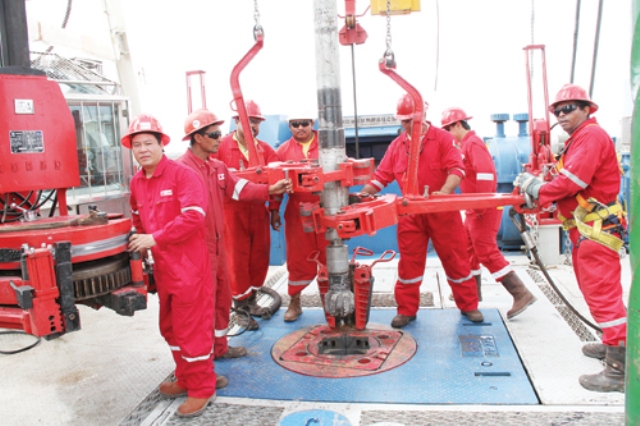Tough time for Vietnamese firms in foreign investments

Vietnamese and Venezuelan workers working on a joint oil and gas project
Some have been forced to halt operation completely or file for bankruptcy, losing billions of USD in foreign investments.
Phung Dinh Thuc, Chairman of the state-owned Vietnam National Oil and Gas Group (PetroVietnam) admitted at during a review meeting late last year that the group failed at its Venezuelan project.
According to him, PetroVietnam has put a stop to an USD8-billion Junin 2 oil field project in the country three years after signing a joint venture contract. This decision was made as a result of an extremely high inflation rate exaggerating inflation rate of 57%.
“With such a gloomy economic situation, no investors dared to start new investments or maintain their current projects,” Thuc commented.
This was a difficult decision for PetroVietnam, as the Junin 2 project, located in Orinoco Belt, consists of large deposits of extra heavy crude, which has an estimated output of 1,400 billion barrels of oil.
It was also Vietnam’s largest foreign investment project to date, and PetroVietnam held a 40% stake in it. They had expected to produce four million tonnes of oil per year and recover their initial investment after seven years.
The two sides are currently negotiating the handover of the project and they may renew their cooperation upon the return of economic stability.
PetroVietnam was also compelled to put an end to six oil and gas projects in other foreign countries which were devoid of profits.
The state-owned Vietnam National Coal-Mineral Industries Group (Vinacomin) invested in five projects in Laos and Cambodia. The group had to stop one of its projects in Laos and lost all USD1.56 million in investment there.
After their studies, they were disappointed to find that the mineral potential at three other projects were much lower than their initial estimates and were not suitable for large-scale development.
Due to fierce competition, and unfamiliar with economic and political policies in foreign countries, some major Vietnamese investors have encountered insurmountable challenges when investing abroad.
Even though Vietnam Military Telecommunications Group (Viettel) has succeeded in investing in seven foreign markets, the group failed in their Myanmar venture. The country has 60 million people, but only 10% use telecommunication services and market has been dominated by two telecom groups from Qatar and Norway.
Hoang Quoc Dung, Vice Chairman of Binh Dinh provincial People’s Committee said last December that several local companies have gone bankrupted after using their assets as collateral to secure loans in order to invest in Cambodian rubber plantations.
An anonymous investor in the field said a hectare of rubber trees can produce two million tonnes of latex per year and bring about an annual revenue of VND2.5 trillion (USD118.28 million), not including the sale of trees.
The market is also very risky, however, depending on volatile prices. Many economists warn that domestic firms should be careful to take proper account of the risks before jumping into such large-scale investment projects.
What the stars mean:
★ Poor ★ ★ Promising ★★★ Good ★★★★ Very good ★★★★★ Exceptional
Latest News
More News
- The generics industry: unlocking new growth drivers (February 04, 2026 | 17:39)
- Vietnam ready to increase purchases of US goods (February 04, 2026 | 15:55)
- Steel industry faces challenges in 2026 (February 03, 2026 | 17:20)
- State corporations poised to drive 2026 growth (February 03, 2026 | 13:58)
- Why high-tech talent will define Vietnam’s growth (February 02, 2026 | 10:47)
- FMCG resilience amid varying storms (February 02, 2026 | 10:00)
- Customs reforms strengthen business confidence, support trade growth (February 01, 2026 | 08:20)
- Vietnam and US to launch sixth trade negotiation round (January 30, 2026 | 15:19)
- Digital publishing emerges as key growth driver in Vietnam (January 30, 2026 | 10:59)
- EVN signs key contract for Tri An hydropower expansion (January 30, 2026 | 10:57)
















 Mobile Version
Mobile Version